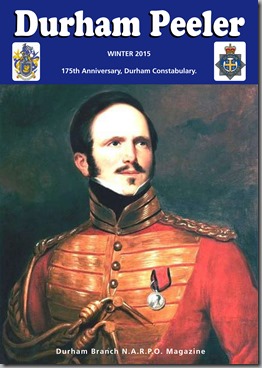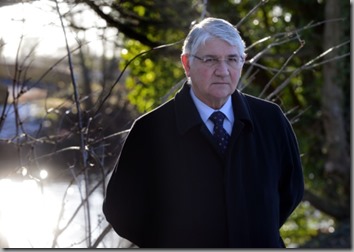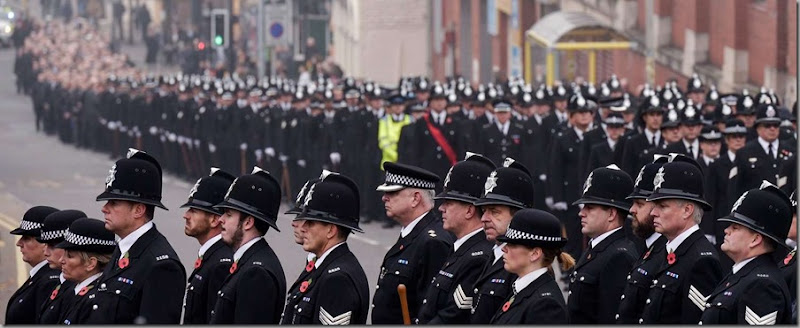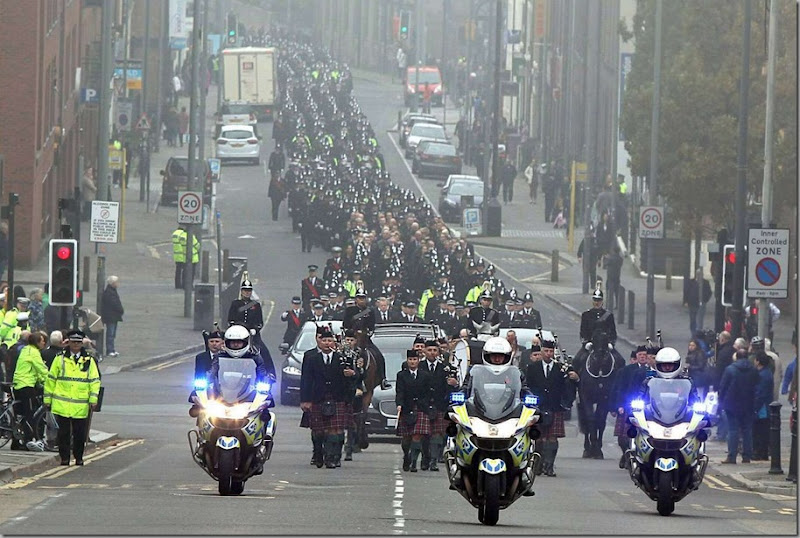Hundreds of people flocked to pay their last respects at the funeral of Merseyside Police’s PC Dave Phillips , who was killed in a hit-and-run.
The congregation stood as the 34-year-old officer’s coffin was carried into Liverpool’s Anglican Cathedral.
Earlier, his widow, Jen, 28, led the procession of mourners through the city’s streets.
Dressed in black, she walked behind her husband’s coffin, which had been draped in a blue Merseyside Police force cloth, holding her seven-year-old daughter Abigail’s hand as younger daughter Sophie, three, followed behind.
PC Phillips died after he was hit by a Mitsubishi pick-up truck while trying to use a stinger device on the stolen vehicle in Wallasey in the early hours of October 5.
Scores of uniformed officers from Merseyside Police had marched behind the hearse as it was led through Liverpool by horses from the force’s mounted department.
More officers from around the country joined in, making the city’s streets awash with a sea of black.
Merseyside Chief Constable Sir Jon Murphy and the region’s Police and Crime Commissioner, Jane Kennedy, were also in attendance.
Inside, the cathedral was adorned with blue and white flowers draped with blue ribbons to symbolise PC Phillips’s work in the force.
Dozens of candles were lit in an arrow shape behind his coffin which stood in the middle of the cathedral.
As the service began, the Reverend Lyndon Bannon, assistant priest at Willaston in Wirral and assistant headteacher of Woodchurch Church of England High School in Wirral, welcomed the mourners.
The Order of Service handed out to the congregation showed a picture of Pc Phillips wearing his uniform and smiling.
Rev Bannon described PC Phillips as “a loving gentleman”.
He said that, as an officer, he had “served the nation” and, like other officers, had put his life on the line every day.
Sir Jon Murphy said the whole of the country had been left outraged by the loss of “one of our finest”.
He added that PC Phillips had epitomised everything that we aspire to be - “a professional force with the human touch”.
In his eulogy, he said: “Constable 6554 Dave Phillips came to the police from the community of the Wirral - a local boy who joined his local force, Merseyside Police, to serve his local community.
“Dave did this with dedication, with humility and with great courage. In serving his community Dave paid the ultimate sacrifice.”
He described him to the congregation as “professional, dedicated, leader, role model, respected and caring”.
He added: “On that terrible night Dave showed dedication to duty, he did everything in his power to keep the public safe, he acted in the finest traditions of the police service. He too was brave.
“But Dave didn’t come home and the police service of the United Kingdom and beyond is here today to honour him.”
Our thoughts are with the family, friends & colleagues of PC David Phillips
 A few dates for your diaries for the festive season :
A few dates for your diaries for the festive season : 












